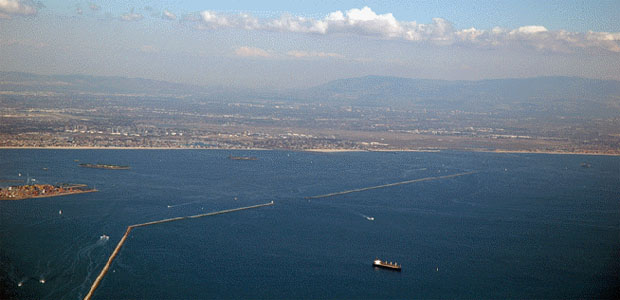
File photo.
The city of Long Beach filed a lawsuit against Monsanto Co. Thursday, claiming the manufacturer’s long-banned cancer-producing polychlorinated biphenyls, or PCBs, are responsible for the contamination of the city’s storm water, port waters, and other bodies of water.
The Environmental Protection Agency (EPA) defines PCBs as manmade organic chemicals manufactured between 1929 until they were banned in 1979, with a range of toxicity and varying in consistency from thin, light-colored liquids to yellow or black waxy solids.
PCBs were used in hundreds of industrial and commercial applications such as electrical, heat transfer and hydraulic equipment, in paints, plastics and rubber products, in pigments, and dyes and carbonless copy paper.
Though PCBs have been banned, products such as motor oil, old electrical devices or appliances, thermal insulation, adhesives, plastics, and oil-based paint may still contain PCBs.
According to the complaint, PCBs find their way to Long Beach waters when they leach, leak, off-gas and escape their intended applications, causing runoff during naturally occurring storm and rain events, after being released into the environment. The affected bodies of water in the city include the Port of Long Beach, Colorado Lagoon and Dominguez Watershed.
Found in bays, oceans, rivers, streams, soil and air, PCBs have been detected in the tissues of all living beings on earth. In humans, exposure can lead to cancer and affect the immune system, reproductive system, nervous system, endocrine system, in addition to other health effects. It also destroys populations of fish, birds and other animal life, the complaint stated.
The city said it continues to “incur significant costs related to PCBs in its storm water and the sedimentary deposits in the Port of Long Beach and adjacent ocean floor areas,” according to a release. In addition, the state’s Water Quality Control Board has determined that the presence of PCBs in stormwater runoff in the city threatens fish and wildlife in the Port of Long Beach.
“The city is committed to holding Monsanto responsible for the significant amount of contamination it has placed into the city’s eco-system and Monsanto should shoulder the burden of cleaning up the environment, not the taxpayers of Long Beach and the state,” said City Attorney Charles Parkin. “Long Beach is standing up for clean water and holding Monsanto responsible for producing and distributing products it knew would become a significant risk to the environment.”
The city is represented by Gomez Trial Attorneys, and Baron & Budd, who filed the lawsuit, the seventh of its kind against Monsanto. Long Beach joins San Jose, San Diego, Seattle, Oakland, Berkeley and Spokane.
“Monsanto unleashed an environmental virus that cannot be contained and is now in virtually every living organism in our food chain,” said Baron & Budd attorney Scott Summy, who leads the litigation for each of the seven cities. “Long Beach is standing up for clean water and holding Monsanto responsible for manufacturing a product it knew would become a global contaminant.”
Attorneys said that although documents show Monsanto recognized PCBs were becoming a global contaminant, Monsanto continued to manufacture PCBs and ignored the health risks to humans and the environment.
“Monsanto knew that PCBs would contaminate water supplies, would degrade marine habitats, would kill fish species, and would endanger birds and animals,” the complaint stated. “In addition, Monsanto knew that PCBs are associated with serious illnesses and cancers in humans and that humans may be exposed to PCBs through ingestion and dermal contact.”
According to the complaint, Monsanto was the sole manufacturer of PCBs in the United States from 1935 to 1979.
The complaint also named Pharmacia Corp. and Solutia Inc. as defendants. The original Monsanto Co. operated an agricultural products business, pharmaceutical ad nutrition business, and a chemical products business, however, since 1997 its businesses were split into three different corporations. It’s old chemical products business is operated by Solutia and its pharmaceuticals business is now operated by Pharmacia, which is a wholly owned subsidiary of Pfizer, Inc.
According to court filings obtained by the Post, the City of Long Beach as the Plaintiff in the case is seeking both compensatory damages and punitive damages, as well as litigation costs and attorney’s fees, pre-judgment and post-judgment interest, and “any other and further relief as the Court deems just, proper and equitable.”
“It’s going to be a tough fight but we are taking it all the way,” Long Beach Mayor Robert Garcia told the Long Beach Post. “More cities need to step up and take on Monsanto for polluting our communities.”
On Wednesday, Monsanto released a statement saying it received an unsolicited, non-binding proposal from BayerAG for a potential acquisition of Monsanto.
“The board of directors of Monsanto is reviewing the proposal, in consultation with its financial and legal advisors,” the release stated. “Monsanto will have no further comment until its board of directors has completed its review.”
Monsanto responded to the lawsuit with the following statement:
“This lawsuit was instigated by trial lawyers who have been aggressively shopping their services to local government officials,” said Scott Partridge, vice president of Global Strategy for Monsanto. “The speculative legal theories being advanced have no basis in the law, and should ultimately be rejected by the courts in California. The facts are clear: There’s no evidence that Monsanto discharged a single PCB molecule into the waters of Long Beach, as Monsanto never had a PCB manufacturing facility in Long Beach or anywhere else in California. Any PCBs that may exist were introduced by unidentified third parties or by the city itself. Monsanto takes seriously its own environmental responsibilities. But in this case, there is no valid claim against Monsanto. If the city wants to deal with these PCBs, it should seek out those who allowed PCBs into the Long Beach water.”
This story was updated at 8:25PM with a statement from Long Beach Mayor Robert Garcia.
This story was updated on 05/23/2016 at 3:00PM with a statement from Monsanto.

